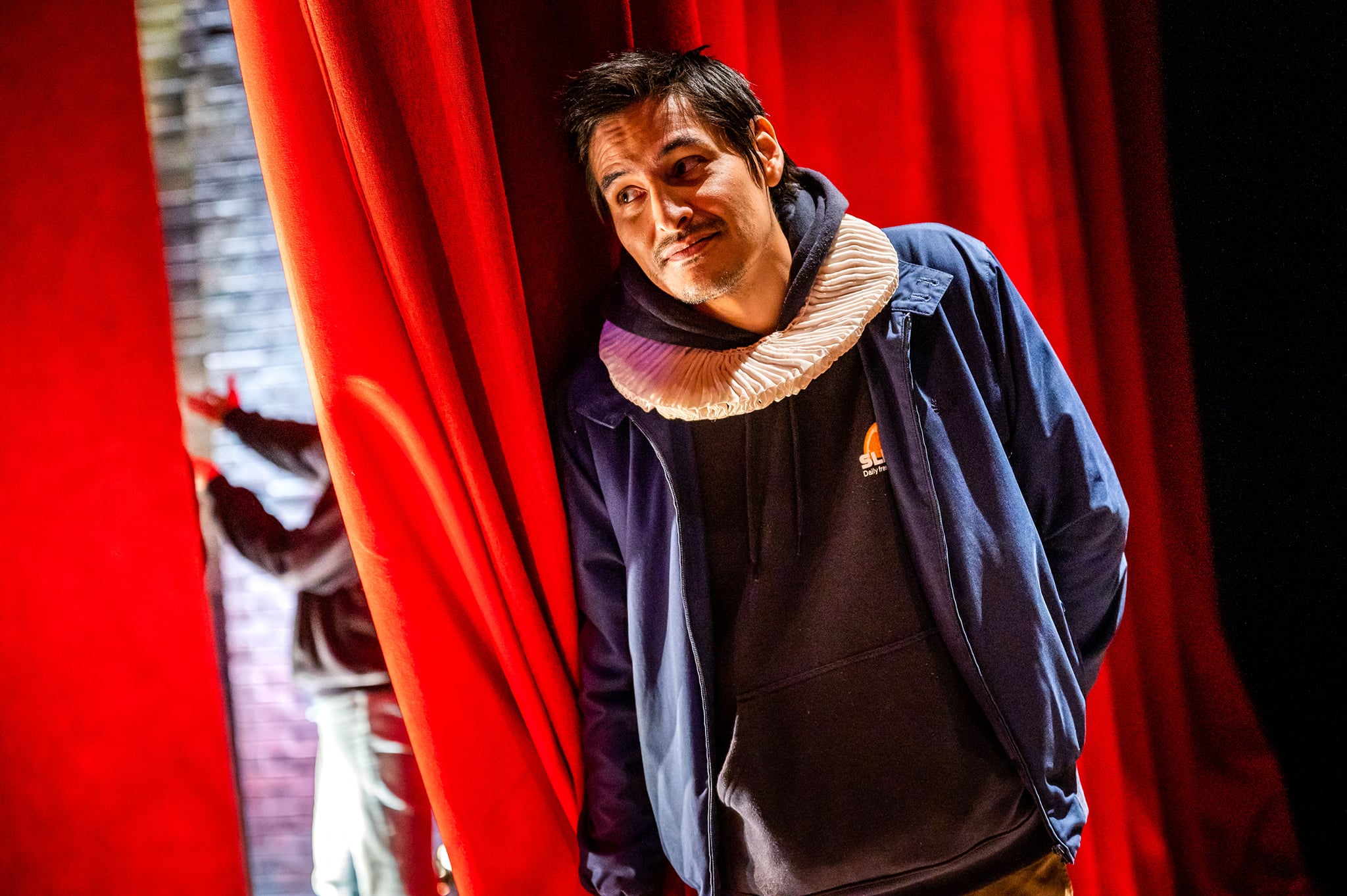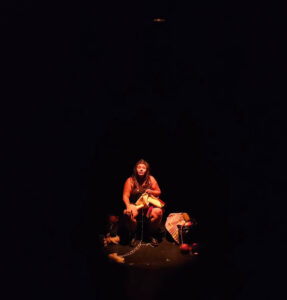
Cliff Cardinal. Photo by Dahlia Katz.
I recently read Cliff Cardinal’s William Shakespeare’s As You Like It: A Radical Retelling, which is available for purchase from Playwrights Canada Press. This is a play that was specifically created for its debut performance back in October, 2021 at Crow’s Theatre in Toronto, where it hinged on an element of surprise (or deception, depending on your point of view), to elicit the full impact of the play. Obviously reading the play and being aware of some of the discourse surrounding it back in 2021 is a more diluted experience, and since its initial run, the play has been remounted at Mirvish under the title The Land Acknowledgment, Or As You Like It, which makes the play’s intentions more clear.
William Shakespeare’s play As You Like It is a pastoral comedy set mostly in the Forest of Arden. George Bernard Shaw thought Shakespeare wrote the play more to please his audiences and less for any higher artistic inspirations. You don’t need to know anything at all about As You Like It to appreciate Cardinal’s play, but it’s worth noting that he has chosen one of Shakespeare’s lighter plays here- a play that has historically been more easily palatable for audiences who are looking for a fun pastoral romp at the theatre. It is also a play set largely in a beautiful rural natural setting, a place similar to what Turtle Island would have been like at the time Shakespeare was writing the play. So, when I was reading it I tried to imagine myself going in with the expectation of seeing some sort of adaptation of Shakespeare’s work.
Cliff Cardinal has performed in Halifax before. His powerful play huff was at Neptune Theatre’s Scotiabank Stage as part of the Prismatic Arts Festival in October, 2022, and I saw it here as part of Magnetic North back in June of 2014. With huff the description that accompanied all the promotional materials about the play said something like this from TicketHalifax, “In huff, brothers Wind, Huff, and Charles are trying to cope with their father’s abusive whims and their mother’s recent suicide. In a brutal reality of death and addiction, they huff gas and pull destructive pranks. Preyed upon by Trickster and his own fragile psyche, Wind looks for a way out, one that might lead him into his mother’s shadow.” Cardinal’s play As You Like It: A Radical Retelling explores how Canadian theatre audiences are finding the plays they choose to go to, and what impact that has on who is seeing which stories, and then even what impact the theatre is having within the cultural and political zeitgeist. Are the people who attend huff, having read that play description, an audience already more open to hearing and being moved by Cardinal’s story? Could you even argue that an echo chamber may be being created, and that those who go in already empathizing with Wind, Huff, and Charles may not actually be Cardinal’s target or ideal audience? What happens when you bring a group of people together under the guise of a light pastoral romp, and then give them instead a play that, while darkly funny and performed, I’m sure, with absolute charm, is actually a hard-hitting examination of where Canada is at fifteen years after the Truth and Reconciliation Commission was established and the word “Reconciliation” began floating around our collective consciousness? Were some of the audience members who came to Crow’s Theatre for the initial run of this play encountering new ideas and perspectives that they had never considered before? If so, surely that alone made this show a success. The play even explores the question of why we go to the theatre at all, a question that was and continues to be even more pertinent as we continue to emerge out of a global pandemic. Who goes to the theatre in Canada and for what purpose? Do we go to be entertained? Do we go to be provoked or inspired, or to be given the opportunity to see things from a different point of view? Theatres across the country program plays every season that are billed as being provocative conversation starters that will leave audiences asking questions, and having debates with one another over drinks when they leave about the pertinent themes the play raised and how they relate to the world around us. How do these conversations differ when an audience goes in prepared to maybe debate their friends in the lobby versus being confronted more unexpectedly? Does this create a more lively, or even a more contentious debate?
As the new title suggests, the play also explores the idea of the Land Acknowledgement, a ritual that audiences have gotten so used to that one does wonder whether it has completely lost any of the effectiveness it may have once had. Folks are coming in with their drinks, rustling in their seats and talking to their neighbour, or turning off their cellphones while the land acknowledgement is being read (often over the sound system). Even for those who are listening, the repetition of it can drain it of its substance. Most of us here in Kjipuktuk in Mi’kma’ki, for example, know by now that we live on the unceded territory of the Mi’kmaq. But now what? What is the next step beyond acknowledging? Cardinal’s play offers a lot to consider in this respect as well.
The act of “deceiving” the audience, of bringing folks in on false pretences is of course powerfully symbolic given Cardinal’s subject matter. In our land acknowledgements here in Mi’kma’ki we are used to hearing that we are all bound by the Peace and Friendship Treaties signed between the English and the Mi’kmaq, Wolastoqiyik, Abenaki, Penobscot, and Passamaquoddy peoples between 1725 and 1779. Like elsewhere in the country, these treaties were signed in good faith by the Indigenous representatives, and over time it became very apparent that the Indigenous nations had been deceived. These treaties would be broken whenever it was advantageous for the British, and later the government of Canada to do so. It is only very recently here in Mi’kma’ki that the settler governments have taken more care to abide by the treaties in relation to hunting and fishing rights- and this remains extremely contentious in some communities in Nova Scotia to this day. It is clear that the Indigenous nations entered into a relationship with England under false pretences. Perhaps it requires the same false pretences to bring some non-Indigenous Canadians back into relationship with Indigenous folks now.
Since its debut at Crow’s Theatre Cliff Cardinal’s play has been lauded and accepted heart-fully within conventional Canadian theatre circles- it was remounted and had a successful run at Mirvish Productions, Canada’s most commercial theatre, it won the Governor General’s Literary Award for Drama in 2023, and was a Trillium Award Finalist. It also caused one theatre critic in Toronto to have a meltdown on her blog. To me, the meltdown might be the biggest success of all, as it proves the necessity of the work. It proves the reason for marketing it as As You Like It. It reminds the people who love the play and who would have found the deception to be funny and clever, people who are already onboard, that there is something incredibly powerful about tricking the people who, very obviously are not at all onboard, into seeing the play too. As a theatre community Toronto has had a front row seat watching one white woman confront her own discomfort with this work. It’s clear she had- and continues to have- a very difficult time with the play’s message, and also the play’s methods. She is the example we can see of how that first production worked so well, but who knows who else was there hearing Cliff Cardinal for the very first time. Did some of that discomfort lead somewhere else- to someone buying a book, or listening to a podcast, or watching a television show that they wouldn’t otherwise have found because they were curious enough to want more information? Did the play lead to conversations that folks were never expecting to have about Shakespeare’s As You Like It, that actually led to someone changing their mind about something? We know theatre has the power to change lives, and we know that plays don’t always find the audience that will resonate with it the most. This is one of the most challenging and frustrating things about the theatre in the age of Netflix. As You Like It: A Radical Retelling found a way to open itself up to an unexpected audience in a way that was new, daring, and cheeky. It is shows like this one that keeps the theatre alive, moving into the future, and finding new audiences who are genuinely excited about what live performance can and might someday do.
William Shakespeare’s As You Like It: A Radical Retelling is available from Playwrights Canada Press, and also is available locally in Halifax at Bookmark and King’s Co–Op Bookstore.
Incoming search terms:
- https://www twisitheatreblog com/?p=4910






